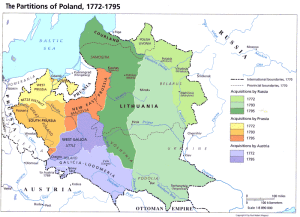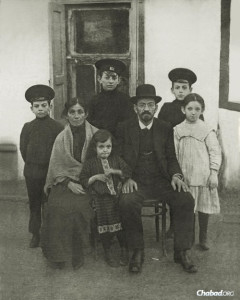Wcag Heading
by Vanora Bennett
Wcag Heading
Jews Under Russian Rule
One of the things that struck me most about Russia in the 1990s, when I was working in Moscow, was how quickly people’s fear of the unknown turned into violent suspicions of other peoples and ethnicities, as their country came apart and hyperinflation struck. If times are hard, you want someone to kick.
After a bit of anti-Semitism – people selling nasty newspapers and the Protocols of the Elders of Zion on street corners (a reminder that the Jews had been Russia’s whipping-boy before 1917) – that modern meanness settled on a new scapegoat, the Chechens. These were the most obstreperous of the little peoples on the edge of Russia, whose leaders wanted independence. I covered the Chechen war that followed, and – while I wasn’t that impressed by the separatist bosses – I had nothing but admiration for the quiet courage of the ordinary teachers and postmen and pensioners caught up in it. Many stayed in their homeland, with war all around. Others took their families and fled to Russia, where they were not welcome. Neither option was easy.
Having witnessed this suffering, when I came to write a novel I wanted to focus on the extraordinary resilience that starting over takes. I made my heroine a Jewish girl, Inna, on the eve of revolution, suffering brutal hardship at the start of the 20th century.
Jews had never been well treated in Russia. They’d come together when, in one of the many re-drawings of the European map, Russia had gained part of Poland, where many Jews lived. Jews under Russian rule were confined to the poor and overcrowded small towns of the south, known as the Pale of Settlement (unless they were rich, or had a specialized trade that would get them a work permit for other parts of Russia). They did not enjoy the same civil rights as other citizens.

Image is in the public domain via globalsecurity.org
But their predicament got much worse after Tsar Alexander II – a rare reformer who’d freed the country’s serfs – was assassinated by student radicals in 1881. His death brought a period of repression so harsh that it ultimately led to revolution.
That little breath of freedom had been dangerous for Russia, concluded Alexander’s son and grandson. The new Tsar, Alexander III, went after all possible dissent, from political liberals petitioning for a say in how their authoritarian state was governed, to bomb-throwing radicals. He persecuted minorities too, and most of all the Jews.
The only connection between the assassination and the Jews was that one of the conspirators, Nikolai Sablin, had a pregnant Jewish girlfriend. Sablin shot himself when the police came for him, but Gesya Gelfman, also called Jessie Helfmann, was arrested and condemned to death. She was allowed to live for 40 days after her baby’s birth – since a fetus was deemed innocent – then hanged. The child died soon afterwards.
Reporting on anti-Jewish rioting in southern Russia after the assassination, the Daily Telegraph of London said “the Jew is represented as the source of all the evils with which Russia is afflicted. They are held up to popular re-probation as the assassins of the late Czar and Jessie Helfmann, the Jewess who was implicated, as having been the soul of the whole plot. The Czar’s assassination happened on a day that is kept up festively by the Jews under Russian Rule, and after the event they were charged with having made merry in anticipation of what was going to happen.”
Pogroms became widespread, although they weren’t – quite – officially sanctioned. Police unaccountably held back from stopping rioting peasants. The government turned a blind eye, then wrung its hands.
Jewish emigration accelerated too. The 1897 census said more than five million Jews lived under Russian Rule (94 percent of them in the Pale). Many were packing their bags. By 1928, two million had emigrated, mostly to America.
One who left was Menahem Mendel Beilis, a father of five and superintendent at a brick factory in Kiev. He went only after such blatant, hair-raising persecution that it finally marshaled Russia’s restive liberals to stand up for his rights.
In 1911, Beilis was accused of ritual murder. He was said to have kidnapped and killed a local boy and drained his blood to make Passover matzos.
The case was a nonsense. The evidence showed the likeliest killers were the underworld associates of the boy’s mother. But Beilis was imprisoned for two years till the court hearing.

Image is in the public domain via chabad.org
His dogged refusal to admit guilt or implicate other Jews prevented an all-out pogrom, but the case provoked several near-riots. The police, experts and prosecution presented forged and fraudulent evidence to the court, only dismissed after liberals in Moscow, Kiev and St. Petersburg came together to fight back.
On being cleared, Beilis and his family moved to Palestine, where he struggled to make ends meet, then in 1921 to America. He died in 1934 and was buried in Queens, NY.
The Jews who stayed in Russia were likelier than the average Russian to join an underground revolutionary party. If they didn’t turn Bolshevik or Menshevik, some opted for the Bund – a Jewish working men’s movement preaching secularism. Bundists believed emigration was a cop-out and the right thing to do was to fight for equal rights within Russia. Their slogan was “doykeit” or “here-ness”.
The risk that hereness could be horrible had been there from the start. One witness to the Elizabetgrad pogrom in 1881 wrote that the atrocities committed, as half the 10,000 Jewish houses were trashed and pillaged, had been “fearful to witness … with neither women nor children spared.”
Living with the fear of this would have been terrifying, if you were a Jewish woman listening to noises in the night. But following the pain is what novelists do. As I read, that fear – and the determination to escape – became what I wanted to track.
Vanora Bennett studied Russian at Oxford University and in the USSR. She is the author of Midnight in St. Petersburg and began her career as a journalist at Reuters and went on to serve as the Moscow correspondent for the Los Angeles Times, winning a U.S. Overseas Press Club award for her writing on Russia. She now lives in Britain and has won the Orwell Prize for political writing for her work at The Times (UK). She is the author of four novels, including Portrait of an Unknown Woman, and two books of nonfiction. She lives in Britain.
